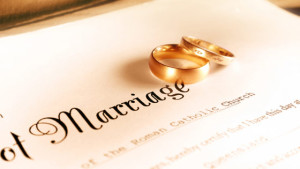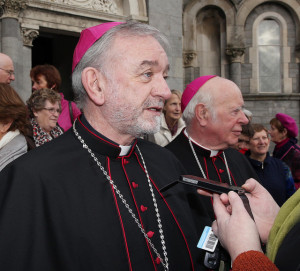
By Sarah Mac Donald - 17 May, 2015
 “These are critical times for marriage in our society” the Bishop of Galway has warned in his pastoral statement on marriage issued this weekend.
“These are critical times for marriage in our society” the Bishop of Galway has warned in his pastoral statement on marriage issued this weekend.
Addressing the forthcoming referendum on same-sex marriage Bishop Martin Drennan said in his statement that since neither the Church nor the State invented marriage, neither can change its nature.
He told the faithful that “Marriage existed long before the existence of either Church or State.”
He was one of three bishops and two archbishops who issued statements this weekend on the issue with less than a week to go to the marriage referendum on 22 May.
Bishop Martin Drennan:
“Fathers and mothers have different gifts, different ways of expressing love. Children are enriched when they have this experience as they grow up. Pope Francis said recently that ‘the family is under threat today by growing efforts to redefine the very institution of marriage’. Marriage brings such great benefits to society that we ought to think very carefully before changing it.”
“The union of a man and a woman is quite different from the union of two men or two women. By nature alone they differ. The biggest difference is that the marriage of man and woman has the capacity to produce new life and provide the best environment for that life to grow. Fathers and mothers bring something different, unique and essential to the raising of their children.”
“In saying this we are not being disrespectful to same-sex relationships. Everyone should be treated with compassion, respect, sensitivity. Legislation governing civil partnerships gives same-sex couples the same rights as heterosexual couples in terms of inheritance rights, next-or-kin status, employment and tax related benefits. Surely ways can be found to protect the civil rights of gay people while also maintaining the fundamental meaning of marriage as commonly understood across cultures and religions down the ages.”
“This referendum is not about same-sex relationships or about equality. It is about the nature of marriage and the importance that society places on the role of mothers and fathers in raising their children.”
“Children have a right to grow up with a father and a mother (Pope Francis). Circumstances sometimes mean that it is not possible for a child to be brought up by his or her parents. We cannot, however, support a referendum which redefines and effectively places the union of two men or two women on a par with the marriage relationship between a husband and wife which is open to the procreation of children. Equality respects and cherishes difference. We are equal in dignity but we have different gifts. Voting no in this referendum is voting to retain our definition of marriage. It is not a vote against equality.”
“If this amendment is passed there will be serious implications. It will become increasingly difficult to speak or teach in public about marriage as being between a man and a woman. There could be lawsuits against individuals and groups who do not share this vision. What will we be expected to teach children in school about marriage or about homosexual acts? Will those who sincerely believe that marriage is between a man and a woman be forced to act against their faith and conscience?”
“This referendum seeks to give constitutional approval to the Children and Family Relationships Bill which proposes to remove all mention of mothers and fathers and which effectively says to parents, children and society that the State should not and will not promote any ideal environment for raising children, and also implies that the natural ties between a child and its father and mother have no real value for the child or for society.”
 Archbishop Kieran O’Reilly: A Pastoral Statement on the Coming Referendums
Archbishop Kieran O’Reilly: A Pastoral Statement on the Coming Referendums
“I write this letter – my first as bishop of the archdiocese of Cashel and Emly – at a moment of singular importance for our country.”
“There is no desire, on my part or that of the bishops, to alienate or denigrate any person or group of persons in our society. We uphold the dignity of each person. And we also hold faithfully to what we have received. We believe that marriage between a man and a woman is an institution that is fundamental to human life and the well-being of society.”
“Marriage is willed by God, and instituted and sanctified by God, to be the way in which God’s work of creation continues in the world. The gift of life, which flows from the intimate union of a man and woman in marriage, is a gift from God Himself.”
“Should this amendment be passed it will be difficult to speak about marriage as it has been traditionally understood. This proposal, if it is incorporated into Art. 41 of the Constitution, will introduce a profound change to our understanding of marriage, of the family and of parenthood. That is why it is important to reflect very carefully on what is the best response to the proposal of the referendum.”
“The second Referendum – to reduce the age at which candidates are eligible for election to the office of President from 35 to 21 also merits careful consideration.”
“Our young people are our future. They are the generation that we look to for energy, initiative and ideas for our country. Young people contribute much to our society many are particularly concerned for the less well-off and for the care of the created world. They are called on to make important decisions from early on in their lives and show themselves very capable in many areas. They are an invaluable part of our society.”
“Every citizen and long-term resident has a vested interest in how society defines and protects marriage and the family founded on marriage.”
“The Constitution is the document which underpins our whole legal system. To define marriage in the Constitution as a relationship between two people without distinction as to their sex, would be a major change. It would mean that family law could no longer give preference to a mother and father relationship as the form of parenthood best suited to the needs of children.”
“It would make it increasingly difficult to speak in public about marriage being between a man and a woman. In the absence of any conscience clause, I would be concerned, for example, at what teachers might be expected to teach our children.”
“I would ask you to consider carefully how a same sex union, however loving, can be said to be the same as marriage. It is true, of course, that all people are equal. Reason, however, points to the truth about human sexuality that makes the relationship of man and woman unique. This uniqueness has been recognised in every culture and has always been associated with the openness of marriage to the gift of life. That is why society has always sought to “guard with special care the institution of marriage”. Why would we suddenly want to change that now?”
“During these past few months, many commentators have described same-sex marriage as a human right. I would ask you to take account of the fact that the European Court of Human Rights, which is not a religious organisation, issued a statement only last summer making it clear that same-sex marriage is not a human right.”
“During the coming days I encourage you to think about the issues involved, to pray for guidance and to vote on May 22nd. The effects of this proposed amendment will be far-reaching for this and for future generations.”
“The Church’s vision for marriage and the family is based on faith and reason. It is shared by other faith traditions and by people who have no religious belief. Since time immemorial, both Church and State have recognised the marriage of a man and a woman to be of fundamental importance for children, for mothers and fathers, for the family and for society.”
“During the debate which has taken place in recent weeks, many people have expressed the view that the Government has chosen to deal with an issue that is exceptionally complex, both legally and morally, in a simplistic manner and with a lightweight approach. It has chosen to ignore the legal and moral issues which have implications for family life and law, for accepted values in society and for recent developments in medical technology which stretch ethics to their very limits, and perhaps beyond.”
“This is not about equality; it is about changing the definition of marriage and the family as we know it. The question each voter must ask is: will the proposed change in our Constitution make our marriages and our family life in the future more secure?”
“During the past forty to fifty years a great change has taken place with regard to the home environment in which children are raised in Ireland. In this regard, it must be acknowledged that single parents and, in recent years, same-sex parents provide children with a loving home environment. But all of this does not take away from the fact that it is the firm belief of the bishops that the traditional family environment of a father, mother and children is in fact the best environment in which to raise children.”
“Parents love their children unconditionally. Some live with family members who are gay or lesbian. As committed Catholics their head pulls them one way and their heart pulls them in another direction. I believe that part of the unconditional love of parents for their children must include the creation of the best environment within which not only their children but all children can grow up.”
“Our duty as Christians and as citizens, is to care for the common good and this means the good of everyone in our society. Everyone, including gay and lesbian people, together with their parents and family members, must think carefully on all the issues involved and vote accordingly. Together we share a responsibility to create a society in which we can all live and benefit from the best possible human and social conditions.”
“If the referendum is carried, Ireland will be the only jurisdiction in the world providing explicitly for same-sex marriage in its Constitution. Indeed, at present, only seventeen of the one hundred and ninety three states recognised by the United Nations, provides for same-sex partnerships in their legislation. If the referendum is carried, it will deeply affect married and family life in this country, and possibly lead ultimately to ethically questionable approaches to the birth and development of children.”
Archbishop Diarmuid Martin:
“Marriage is not simply about a wedding ceremony or about two people being in love with each other.”
“I ask you to reflect on why humans exist as male and female? It is not an accident or a social construct. There is a unique complementarity between men and women, male and female, rooted in the very nature of our humanity. I believe that this complementarity belongs to the fundamental definition of marriage. The vast majority of States in Europe and worldwide interpret marriage in that sense.”
“I encourage you to consider very carefully the profound implications which the constitutional amendment on marriage would have on the family and on our understanding of parenthood.”
“Some say that the change will not affect those who do not agree with it and will not affect marriages which take place in Church. No politician can promise that, since it will be exclusively up to the courts to interpret the changed Constitution.”